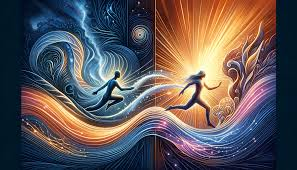
Human decision-making often hinges on two powerful yet distinct forces: instinct and intuition. While they may seem similar, they originate from entirely different aspects of our being. Understanding these forces not only sheds light on our behaviors but also empowers us to make more informed and balanced decisions. Here, we’ll explore five key distinctions between instinct and intuition, highlighting how each plays a unique role in our lives.
1. Origin: Nature vs. Experience
At its core, instinct is a biological inheritance. It is hardwired into us to ensure survival, such as the instinct to pull our hand back from a hot stove or the fight-or-flight response to danger. These responses are embedded in our DNA and shared across species.
In contrast, intuition stems from subconscious processing of our accumulated experiences and knowledge. It is not something we are born with but something we develop over time. For example, a seasoned entrepreneur might “just know” when a business deal feels off. That gut feeling comes from years of learning, pattern recognition, and subconscious analysis.
2. Consciousness: Automatic vs. Awareness-Driven
Instinct operates on autopilot, bypassing conscious thought entirely. It is an immediate, automatic reaction to stimuli, ensuring quick responses in critical moments. For example, flinching when something suddenly moves toward you is an instinctive response.
On the other hand, intuition involves subtle awareness. It is not as immediate as instinct and requires a moment of internal processing. Intuition often manifests as a quiet whisper or a gut feeling that guides decision-making. While it may not demand conscious thought, it is deeply influenced by our subconscious mind and emotional intelligence.
3. Universality: Shared vs. Personal
Instincts are universal across species. They are the same for everyone and follow predictable patterns, such as the maternal instinct to protect offspring or the instinct to seek shelter during a storm. These behaviors are consistent because they are evolutionarily programmed for survival.
Intuition, however, is highly personal. It varies greatly from person to person, depending on their individual life experiences, knowledge, and perceptions. For instance, a musician might intuitively recognize the right note to play in a melody, while a chef might instinctively know when a dish needs more seasoning.
4. Complexity: Simple Reactions vs. Holistic Insights
Instinct is straightforward and specific. Its simplicity is its strength, as it enables quick and decisive actions. For instance, hunger is an instinctive drive that signals the need to eat, ensuring we sustain ourselves.
In contrast, intuition is more complex and multi-faceted. It integrates diverse pieces of information—sometimes without us realizing it—into a cohesive insight. Imagine walking into a room and instantly sensing tension between people. This intuitive awareness arises from subtle cues like body language and tone of voice, processed subconsciously into a holistic understanding of the situation.
5. Timeframe of Development: Innate vs. Learned
Instinct is present from birth or develops naturally without the need for learning. A baby instinctively cries to signal discomfort, and animals instinctively know how to hunt or migrate. These behaviors require no training.
Intuition, by contrast, is cultivated over time. It grows stronger with experience and learning. For instance, a firefighter develops an intuitive sense of danger in a burning building through years of exposure to similar situations. This ability is not innate but honed through practice and reflection.
Bringing It All Together
While instinct and intuition often work in tandem, understanding their differences can help us use them more effectively. Instinct is our primal safeguard, reacting quickly to protect us from harm. It keeps us grounded in the physical world. Intuition, on the other hand, is our subtle guide, offering deeper insights that draw from our personal experiences and subconscious wisdom.
Imagine facing a critical decision. Instinct might urge you to flee a threatening situation, while intuition could provide nuanced guidance, helping you navigate the challenge more strategically. Recognizing when to rely on instinct and when to trust intuition is a skill that can transform how we approach life’s complexities.
By decoding these natural forces, we gain the ability to align with both our biological heritage and our learned wisdom, creating a balance between survival and self-awareness. Instinct keeps us alive, but intuition helps us thrive.
Which will you listen to today—nature’s reflex or the mind’s wisdom?
